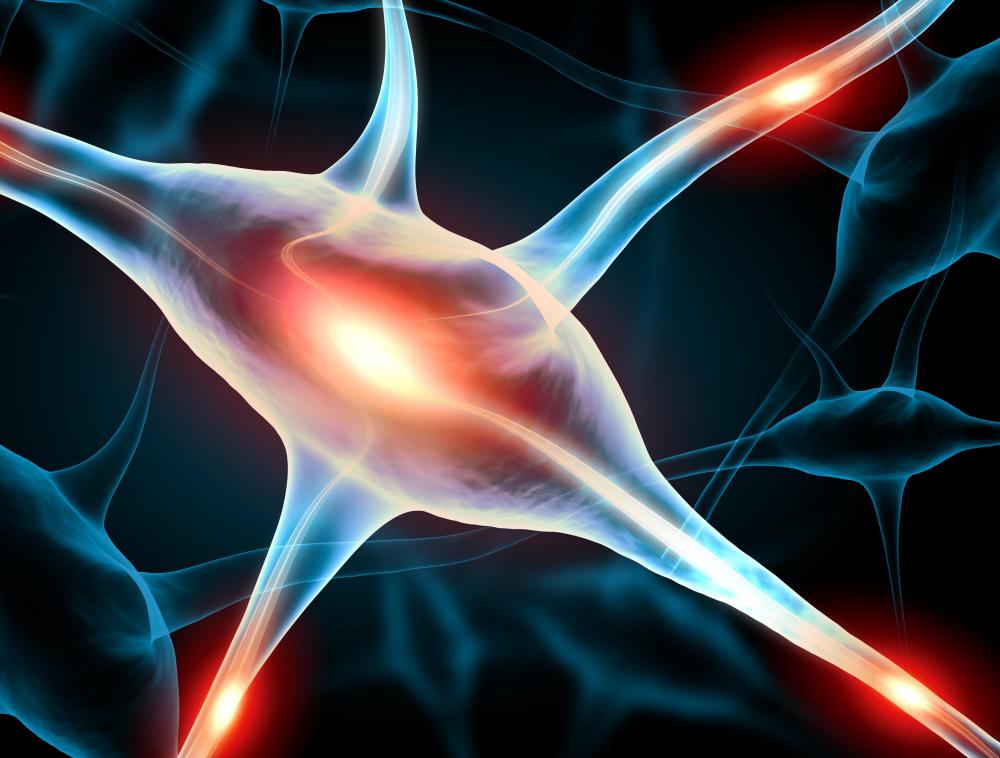At TheHealthBoard, we're committed to delivering accurate, trustworthy information. Our expert-authored content is rigorously fact-checked and sourced from credible authorities. Discover how we uphold the highest standards in providing you with reliable knowledge.
What is a Motor Neuron?
A motor neuron is a type of cell in the nervous system that directly or indirectly controls the contraction or relaxation of muscles, which in most cases leads to movement. Motor neurons are also called motoneurons or efferent neurons. While efferent neurons carry information from the central nervous system to muscles and other systems, afferent neurons, or sensory neurons, carry information from sensory organs and tissues such as eyes and skin back to the central nervous system.
While it is a cell, a motor neuron has a unique design that best allows it to serve its purpose. A neuron is composed of three parts: the dendrites; the cell body, or soma; and the axon. The dendrites branch out from the cell body and receive the electrochemical signals from other units of the nervous system. The cell body, or soma, contains the necessary cellular components and genetic information needed to keep the cell functional. The axon, or nerve fiber, is considered the most important part of the neuron; the long, thin fiber conducts electrical impulses and sends signals where they are needed.

Generally speaking, a motor neuron can fall into one of three broad categories. Somatic motoneurons are directly involved in the contraction of skeletal muscles and are typically involved in locomotion. Special visceral motoneurons are involved in the motion of gills in fish and the motion of neck and facial muscles in vertebrates. General visceral motoneurons, sometimes simply called visceral motoneurons, are directly involved in the contractions of the heart, the muscles of the arteries, and other viscera that are not consciously controlled.

Motor neurons differ slightly in function between vertebrates, who have spinal columns, and invertebrates, who do not have spinal columns. In vertebrates, a motor neuron can only be contractile; motor neurons can not directly relax muscles. The relaxation of muscles is only caused by the inhibition of motor neurons. In invertebrates, motor neurons can both directly contract and directly relax muscles.

Motor neurons can be affected by a class of diseases known as motor neuron diseases. These diseases tend to impede muscular control in the body, and can affect such actions as speaking, eating, walking, and breathing. Motor neuron diseases are typically referred to as amyotrophic lateral sclerosis. The specific causes of most cases of amyotrophic lateral sclerosis are unknown, though a strong genetic basis is suspected. Despite extensive research, there is generally no cure for motor neuron diseases.
AS FEATURED ON:
AS FEATURED ON:















Discussion Comments
A nueron cell will be helped with Vitamin E.
The motor neuron cell is unique in design and can rapidly respond to stimuli in order to send a very fast signal via their dendrite system. The chemicals used to transmit these electrochemical signals are called neurotransmitters, and work at almost light speed.
A well-oiled motor neuron system enables people to make quick and rational decisions. This is usually a good measure of intelligence, and can always be improved. Vitamin E is an important supplement to help dispose of harmful wastes which may cause damage to the motor neuron.
Post your comments